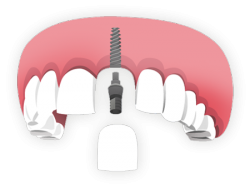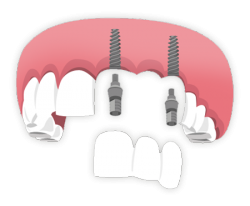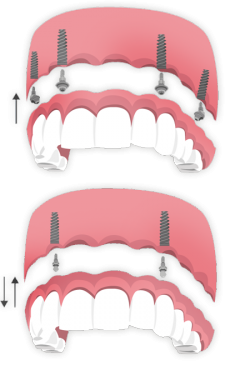
Dental Implants
What are dental implants?
Dental implants are small screw-like posts that are used to replace the root of a missing tooth.
They are surgically inserted into the jawbone underneath the gums in order to support dental prosthesis, such as crowns, bridges or dentures.
The procedure aims to improve your health, enhance your chewing functions and restore your natural smile.
The different types of restoration options

Single Tooth Restoration
An implant is inserted to replace the root of the missing tooth and a crown is fixed on it.
This is the most advanced and effective way to replace a single missing tooth, while maintaining a natural look and feel, as well as preserving the bone and neighboring teeth.

Multiple Teeth Restoration
Implants are inserted where the teeth are missing, in order to support several crowns or a bridge.
The procedure aims to keep your jaw healthy and esthetically pleasing.

Full Mouth Restoration
Edentulous patients can benefit from full mouth restoration supported by implants.
A fixed denture supported by four or more implants will provide you with permanent teeth, restore your natural smile and enhance your self-confidence.
Removable dentures can be anchored by two or more implants. Implant-retained dentures are much more convenient than standard dentures, providing excellent stability and a high level of comfort.
Dental Implants FAQ:
How implants are usually inserted?
– A qualified dentist thoroughly examines your teeth and determines the implant treatment procedure that is right for you.
– Your implants are inserted via a surgical procedure.
The procedure is not painful since it is performed under local anesthesia. Any pain or discomfort after the surgery can be managed with analgesic drugs.
– On most occasions, implants require a healing period of 3 to 6 months before prosthesis placement.
Sometimes, depending on surgical conditions, prosthesis may be placed during the same day, in what is generally called immediate function.
– It is at the dentist’s discretion when the adequate prosthesis can be placed. The prostheses can be fixed (like a crown or bridge) or removable (like dentures).
Why replace lost teeth with implants?
Dental implants are permanent, reliable and designed to last for many years, keep your jaw bone volume and quality, preventing bone loss and gum recession.
How should you take care of your implant-supported dental prosthesis?
Crown or bridges supported by dental implants require the same care and treatment as natural teeth.
They should be brushed and flossed regularly in order to keep clean and plaque free.